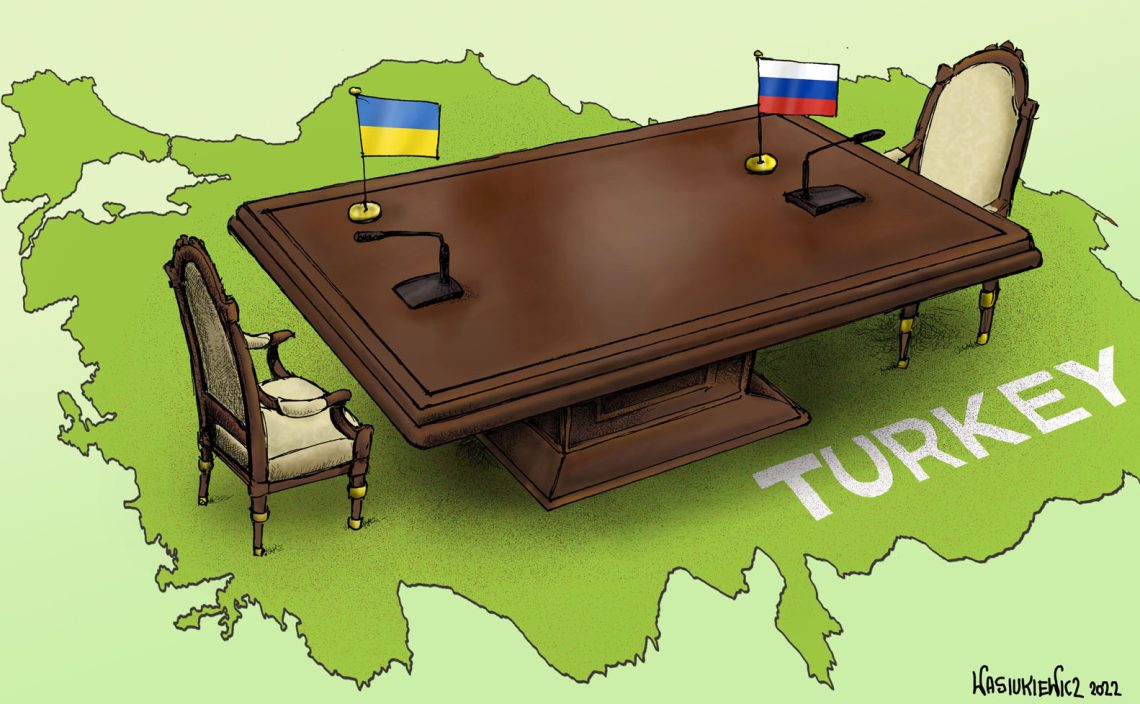‘For God’s sake, this man cannot remain in power’
Russia’s destruction in Ukraine could go on for a long time. If the two sides are to find an agreement, the West will have to stop fueling Russian fears of domestic interference.

United States President Joe Biden delivered an important and, at times, emotional speech in Warsaw. The U.S. leader emphasized NATO unity and called its collective defense principle, Article 5, “a sacred commitment.” He harshly deplored the Russian invasion and brutality against the Ukrainian population. Toward the end, apparently departing from the prepared text, he said of Russian President Vladimir Putin: “For God’s sake, this man cannot stay in power.”
Mr. Biden visited Poland following an emergency summit at the NATO headquarters in Belgium. Poland is the main destination for Ukrainian refugees. The president met displaced Ukrainians near the border and then flew to Warsaw, where he gave the mentioned speech.
Scorched-earth strategy
At the start of the invasion, Moscow likely underestimated Ukraine’s defensive capabilities while overvaluing the aptitude of its own armed forces. A brutal war of attrition has ensued. Ukrainians have shown impressive grit and fighting skills. However, in the long term, Russia is stronger. The U.S. and NATO have restricted themselves to supporting Kyiv with war materiel and economic sanctions against Russia.
Under these circumstances, the destruction in Ukraine may continue for an extended period, even though the government of President Volodymyr Zelenskiy will try to avoid this outcome at all costs.
Russia is mainly interested in the eastern part of the country, and it also wants to prevent Ukraine from joining NATO. However, its overarching objective is to prevent the U.S. and Western Europe from interfering in the Russian Federation’s internal affairs. The Kremlin thinks in terms of realpolitik and zones of influence.
Turkey has been working hard to keep the Kyiv-Moscow talks alive. This dialogue is critical to get both sides to agree to a cease-fire and prevent further destruction of Ukraine. Most likely, the Kremlin has little appetite for expanding its faltering invasion into Western Ukraine, where Russian forces could meet with even stronger resistance. Western Ukraine has a Polish-Austrian history; the Soviet Union incorporated it following the 1939 partition of Poland between Stalin and Hitler. President Putin cannot be interested in creating an Afghanistan-like asymmetric battlefield in Ukraine.
Urge to punish
The West must stand firm against this Russian aggression. However, NATO will continue to avoid direct military involvement unless the conflict escalates. It probably is an illusion – even if many in the West harbor it – that Russia’s policy would change if President Putin was removed from power.
Russia’s overarching objective is to prevent the U.S. and Western Europe from interfering in the Russian Federation’s internal affairs.
There is only one realistic way to avoid further bloodshed and destruction in Ukraine. Moscow and Kyiv need to reach an arrangement that, on the one side, would validate the West’s point that such transgressions are not allowed and, on the other side, would let Russia feel that the West is ready to respect its internal governance system. For such an agreement to come into existence, it must be based on realpolitik, not a desire to punish.
It is a welcome development that the talks in Turkey are now conducted directly between Kyiv and Moscow, without the involvement of the U.S.
The conflict in Syria offers a valuable lesson: good negotiations start with no preconditions. After the start of the civil war there in 2011, the administration of U.S. President Barack Obama and the European governments put forth a precondition: President Bashar al-Assad had to go first and be put on trial. That made a solution impossible. Had negotiations back then been pragmatic and without preconditions the disaster that eventually caused hundreds of thousands to lose their lives and millions to be displaced could have been prevented. President al-Assad is still in power.
Face to face
Sadly, even the most justified urge to punish can block solutions that, while imperfect, may prevent bloodletting. Pragmatism is the foundation and essence of prudent statesmanship. Of course, this does not relieve leaders from their duty to defend their country and protect citizens’ freedom.
In the dramatic present circumstances, the U.S. president’s angry words about Mr. Putin were counterproductive and dangerous, and a show of poor statesmanship. Russian imperialism is not limited to President Putin personally; we need to acknowledge it as a historical trait. Following the Warsaw speech, the White House tried to walk the statement back, but President Biden stuck to his guns: he had expressed “moral outrage,” he said, while denying that he was “articulating a policy change.” This incident will only enhance Russian fears of foreign intervention in their internal affairs. The massacre in the Ukrainian city of Bucha, revealed to the world last week, illustrates the brutality of the war. The expression of outrage is justified, but the underlying problem will not be solved by a change of regime in Moscow.
It is undoubtedly good news that the negotiations in Turkey are now taking place without further American and Western European presence.
